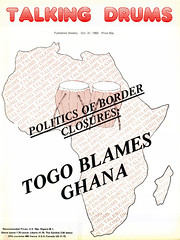Politics Of Border Closures And Destabilisation
The Togolese government explains the continuing misunderstanding about the closure of the common border between Togo and Ghana.The government of Togo has blamed the Ghana authorities for the continued closure of their common border.
In a statement to a meeting of Ambassadors, Consular representatives and representatives of international organisations in Lome, the Togo government accused the Ghanaian authorities of lying about the circumstance surrounding the border's closure and denied ever closing its borders with its neighbours.
A catalogue of events as listed in the statement of the Togolese Foreign Minister, Akakpo-Ahianyo was listed as follows:
On 21st September 1982, the Ghanaian authorities decided unilaterally to close their borders with their neighbours. At the time, the Accra authorities informed the three countries of the decision which, according to them, was aimed at combating smuggling. The note from the Ghanaian Ministry of Foreign Affairs said as soon as the fixed objectives had been attained, Ghana would reopen its borders.
Since then, and especially since 5th September 1983, the Ghanaian authorities have made statements from time to time announcing to the world that Ghana had reopened its border with Togo and that it was the Togo side which had refused to reciprocate. In the name of the Togo Government, I would like to reaffirm the truth in the situation, which is not as the Ghanaian authorities regularly presented it.
After deciding unilaterally to close its borders, Ghana contacted Togo and proposed the opening of the border at one entry at Aflao. We replied that the border between our two countries did not comprise just one point of entry and that besides, our two countries are signatories of international consular agreements and of the ECOWAS draft treaty on free movement of people and goods between member countries.
Neither of these agreements permit two signatory countries to agree to momentarily violate some of their terms. Togo respects international agreements that it signed freely and will not be an accomplice to any form of violation of these agreements.
Ghana then proposed to us the opening of two or three, and last time four border posts. We gave the same reply. On 5th September this year, Ghana announced to the world that it had reopened its border with Togo but at the same time Ghana sent a verbal message to the Togo Government informing it that four border posts with Togo had been reopened.
Ghana chose the four posts without seeking our opinion. Naturally, we maintained our stand. The border between our two countries is several hundreds of kilometers long and has more than one point of entry. Why should we penalize the sections of our population in areas where the border posts would remain closed?
Recently, on 18th October 1983, the Ghanaian authorities released a press communique stating once that the border had been reopened on the Ghana side and that it was the Togo side which had remained closed. They did not mention the fact that they had informed us that the border would be closed except four points of entry, which we cannot accept.
We repeat the truth of the matter: Togo has never closed its borders with its neighbours. It was Ghana which closed its borders on 21st September 1982. It was only after many friendly attempts by Togo that our country decided to close its borders if the opposite borders remained closed. Therefore, the reality is that the Ghanaian authorities have maintained the closure of the borders and proposed that we accept this state of affairs except at four points. Besides, we do not know precisely why. We do not know why.
We reiterated our readiness to reopen our borders on the day, the hour and the minute Ghana decided to reopen its borders without restrictions. We will do it within the framework of strict respect for Ecowas agreements and international consular agreements, which Togo is determined to respect scrupulously.
The destabilization process continues in the West African sub-region
TOGO FAILS TO FALL
Given the trend of destabilization in West Africa it was not unexpected that Togo should be the next target.Indeed the long arm of destabilization had been prepared to reach any of the neighbouring countries of Ghana and Upper Volta, both of which are experimenting with the Libyan style of people's government.
Even though news of the destabilization attempt in Togo was not revealed until a fortnight ago, a month after it had been crushed and a number of young military officers arrested, a sudden upsurge in the flurry of delegations to President Eyadema's office during the past week was ample evidence of unusual developments in the country.
The presence of the delegations also provided President Eyadema the opportunity to redefine the Togolese revolution which he said is neither red, black not blue and pledged to defend in every way against any attempt from any quarters.
President Eyadema explained that the realistic revolution was independently chosen by the Togolese people and is aimed at providing the people with the right means to a peaceful existence.
"The Togolese people", General Eyadema declared, "will never allow a foreign ideology to be imposed on them, they have themselves chosen their path because it responds to their profound aspirations."
He urged the youth to make sacrifices to safeguard the national heritage and be permanently vigilant in the joint task of nation-building in peace and harmony.
Among the delegations to renew their support to the President were several from Tchaoudgo and Bina provinces. Motions of support were also sent by the Rally of the Togolese People and the National Movement of Togolese students in which they denounced the negative behaviour and diabolical attitudes of some young people who were recently caught red-handed in counter revolutionary activities. They also expressed their gratitude and admiration for General Eyadema's policy of peace and national development.
